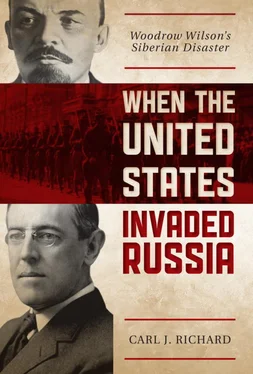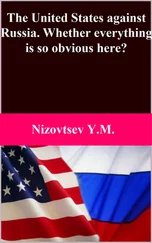On May 30, at another meeting with Wilson, Wiseman argued that the Russian situation could not be worse. Wilson strongly disagreed. Wiseman recorded the president’s observations: “We could make it much worse by putting the Germans in a position where they could organize Russia in a national movement against Japan. If that was done he would not be surprised to see Russian soldiers fighting with the Germans on the Western Front.” Wilson knew that he was not the only one who worried that Japanese intervention would drive Russia into the arms of Germany: so did prominent anti-Bolsheviks, who advocated a multinational Allied intervention instead, and so did some of the Japanese themselves. This widespread belief was understandable, given the racial and cultural animosity between the Russians and the Japanese and given the fact that Japan had inflicted a humiliating defeat on Russia in the Russo-Japanese War only fourteen years earlier. [26] W. B. Fowler, British-American Relations, 1917–1918: The Role of Sir William Wiseman (Princeton, N.J.: Princeton University Press, 1969), 180; U.S. Department of State, Foreign Relations, Russia, 1918 , Roland S. Morris to Robert Lansing, December 16, 1917, vol. 2, 9; Memorandum of Breckinridge Long, March 2, 1918, vol. 2, 62; Woodrow Wilson to Robert Lansing, April 29, 1918, vol. 2, 144; Link, Papers of Woodrow Wilson , Sir Cecil Rice to the Foreign Office, December 27, 1917, vol. 45, 370; December 29, 1917, vol. 45, 393; Lord Robert Cecil to the British Embassy, January 1, 1918, vol. 45, 420; Sir William C. Greene to the Foreign Office, March 7, 1918, vol. 46, 571.
Furthermore, beginning in March 1918, Wilson received assurances from the Japanese that convinced him that they would not invade Siberia without his consent. On March 7, Wilson learned that Japanese Foreign Minister Motono Ichiro had just intimated to the British that Japan would find it very difficult to intervene in Siberia without American materials and financial aid. On March 19, Motono handed Ambassador Morris a memorandum that Morris forwarded to the president. The memo assured Wilson that Japan would “refrain from taking any action on which due understanding has not been reached between the United States and the other great powers of the Entente.” On April 29, Lansing reported concerning his meeting with Ambassador Ishii: “My interview with the Ambassador was in every way satisfactory. He is most frank and evidently desirous to do only what is entirely acceptable to this Government, and he assured me that is the wish and purpose of his Government.” Ishii had also remarked that Japan did not want a “Germanized Russia,” the likely result of a unilateral Japanese intervention in Siberia. On May 16, Ambassador Morris reported that the Japanese cabinet did not wish to intervene unilaterally, although the French were pressuring Japan to do so. On June 22, Morris reported that, despite alarm in Japan over the “growing disorder in Siberia,” the Japanese still did not wish to incur American disapproval by intervening alone. [27] Link, Papers of Woodrow Wilson , Sir William C. Greene to the Foreign Office, March 7, 1918, vol. 46, 571; Roland S. Morris to Robert Lansing, March 19, 1918, vol. 47, 77; U.S. Department of State, Foreign Relations, Russia, 1918 , Robert Lansing to Woodrow Wilson, April 29, 1918, vol. 2, 144; Roland S. Morris to Robert Lansing, May 16, 1918, vol. 2, 162–63; June 22, 1918, vol. 2, 219.
But the most pleasing news came on June 26, when Ishii wrote to Lansing that despite intense British and French pressure, the Japanese government had just announced that its officials “could not feel at liberty to express their decision before a complete and satisfactory understanding on the question was reached between the three powers and the United States.” Lansing showed this telegram to the president on the following day, and on June 28, Wilson replied, “I have read this communication with genuine pleasure.” Indeed, after the May 30 meeting with Wilson, Wiseman had written regarding the president: “He realized that the U.S. Government held the key to the situation in that the Japanese Government would not intervene without their sanction; but it would be odious for him to use such power except [as] the best interests of the common cause demanded it.” The fact that the Japanese had not already intervened in Siberia in the absence of American approval, despite many months of British and French pressure to do so, must have reinforced Wilson’s belief that the Japanese would follow his lead, whatever he decided. If he intervened in Siberia, it would have to be for reasons other than any anxiety over what the Japanese might do. [28] Link, Papers of Woodrow Wilson , Ishii Kikujiro to Robert Lansing, June 26, 1918, vol. 48, 449; Wilson to Robert Lansing, June 28, 1918, vol. 48, 457; Fowler, British-American Relations , 180–81.
The Allied Pressure Theory
The third intervention theory, advanced by Eugene P. Trani, maintains that Wilson decided to intervene in Siberia as a result of a tremendous campaign, launched by the British and French, to pressure him to do so. Trani claims that a flood of Allied pressure, reaching its height in the summer of 1918, forced Wilson to swallow his misgivings and submit to intervention. This decision, suggests Trani, was made easier by Wilson’s preoccupation with the enormous enterprise of mobilizing two million men for the Western Front. [29] Eugene P. Trani, “Woodrow Wilson and the Decision to Intervene in Russia: A Reconsideration,” Journal of Modern History 48 (September 1976): 452.
Perhaps the only point on which all historians of the Siberian intervention agree is that Allied pressure on Wilson to intervene was strong and continuous. Japan had demonstrated that it would not intervene without American support, and the British and French felt that only Japan, the sole ally whose forces were not committed to the Western Front, could supply enough troops for a new Eastern Front against the Central Powers, their ardent dream. Thus, it was absolutely necessary to obtain Wilson’s approval of intervention.
The Allies attempted to gain that approval through the dual methods of isolation and direct pressure. First, William Wiseman attempted to isolate Wilson on the Siberian question. Wiseman proposed to do so by obtaining the consent of Wilson’s chief military advisers, Tasker Bliss and Newton Baker, and of his chief political adviser, Colonel Edward House, for intervention. In the first two instances they failed. On June 4, 1918, Bliss complained to Secretary of War Baker:
British and French general staff bureaus and their ministries of foreign affairs give out nothing but that which is favorable to the idea of this intervention…. Then I make myself a sort of an advocatus diaboli and suggest conceivable disadvantages, merely for the purpose of assuring that the question will be fairly considered in all of its phases. I note a feeling of irritation. In other words, I have never seen or heard the question rationally discussed here, as though the parties to the discussion really wanted to get at all of the “ins and outs” of it. I do not believe that the question can be considered in this unbiased light anywhere except in Washington.
He was preaching to the choir. Baker made a similar nuisance of himself by pointing out to the British and French that Japanese intervention could accomplish nothing since the Japanese were adamant in their refusal to proceed west of Irkutsk: “I mentioned to Lord Reading that Irkutsk was too many thousand miles from the eastern front to be of any help. He replied, ‘It is nearer than Vladivostok,’ to which I replied that that sounded to me like saying that a man was nearer the moon when he was standing on top of his house, in view of the fact that he would still be too far away to have any chance of getting there.” [30] Link, Papers of Woodrow Wilson , Sir William Wiseman to Sir Eric Drummond and Lord Arthur Balfour, February 4, 1918, vol. 46, 248; Memorandum by Sir William Wiseman, March 9, 1918, vol. 46, 591; Frederick Palmer, ed., Bliss, Peacemaker: The Life and Letters of General Tasker Howard Bliss (New York: Dodd, Mead, 1934), Bliss to Newton D. Baker, June 4, 1918, 295; Newton D. Baker to Bliss, July 8, 1918, 302.
Читать дальше












